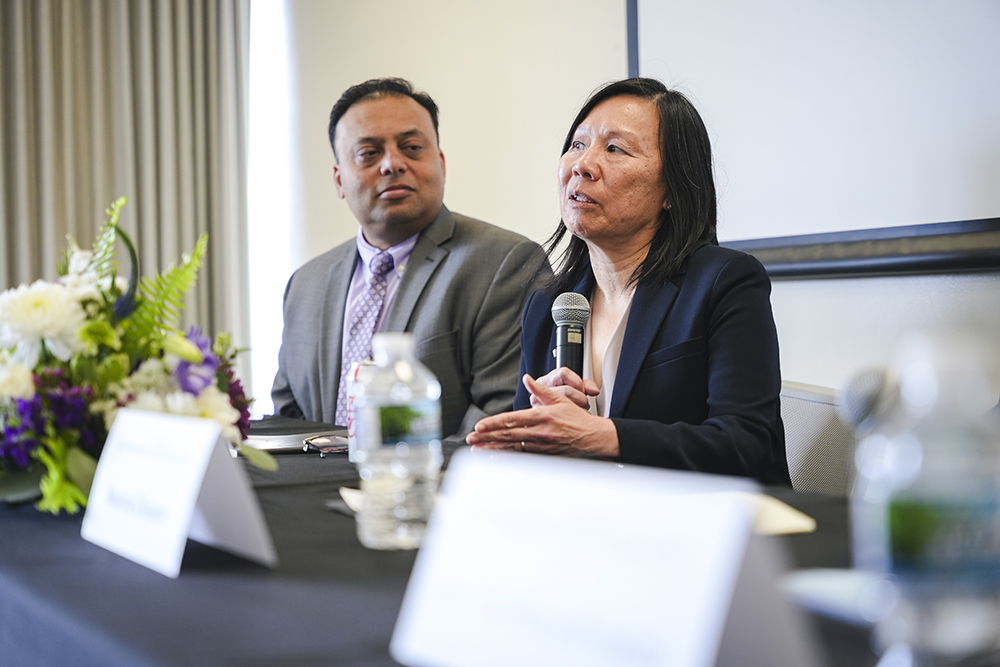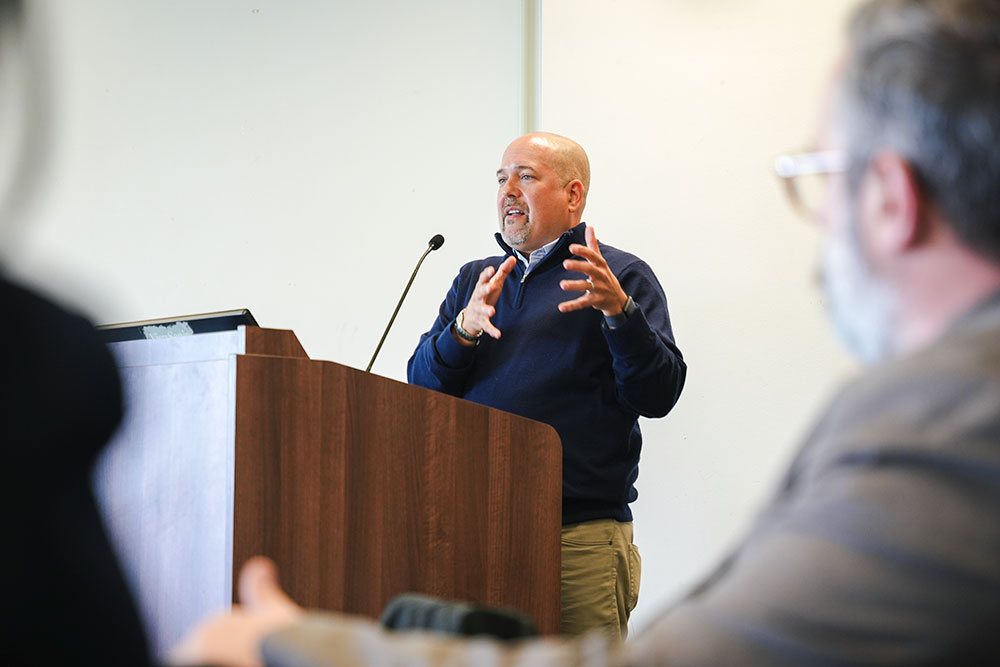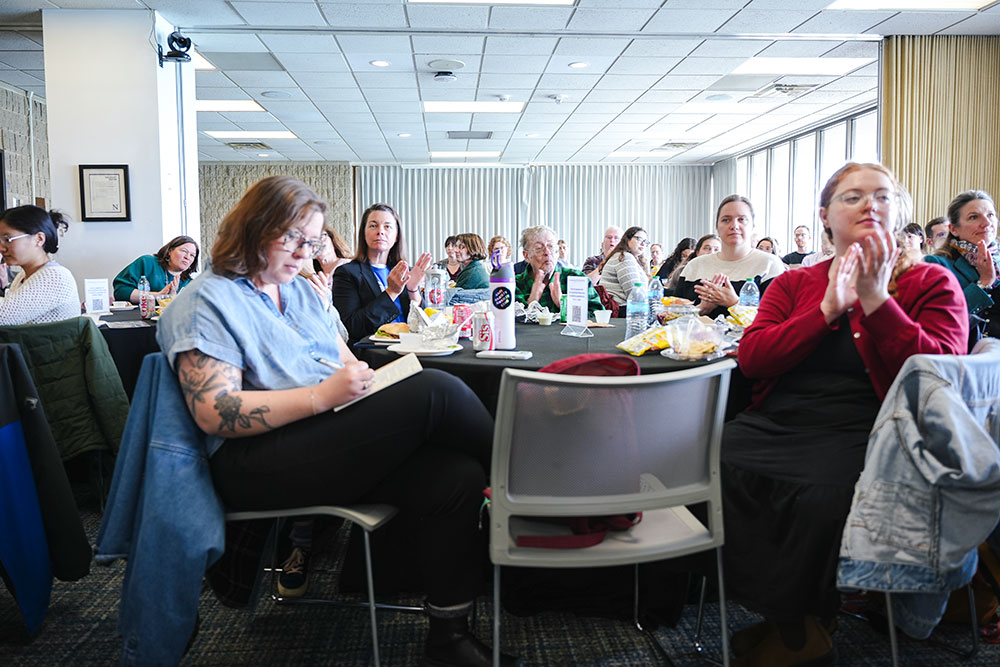How Can Research Inform Public Policy?
Seasoned Chicago policymakers discuss how evidence gets used at the policy table
Get all our news
If you're looking for it to translate, you have got to really work closely with the translators before it sees the light of day, so we can try to make as much of an effective impact as possible.”
Avik Das
Executive director, Cook County Justice Advisory Council

During a Northwestern panel, Jadine Chou, sitting next to Avik Das, talks about her experience working with researchers during her time at Chicago Public Schools.
On May 5, three local policymakers shared their insights on how evidence has informed their policy decisions at an IPR panel, “Evidence into Impact: Research at the Policy Table.”
“What we're talking about today is how people are using this information to leverage change in different spaces and hopefully improve people’s lives,” IPR Director and sociologist Andrew Papachristos told the 50-plus faculty, students, and community members attending.
“You're going to hear from three incredible leaders who have been at the table, where decisions have been made in city government, in schools, in public safety, in courts, in all different spaces,” he said.
Using Evidence to Shape Better Policy
During the COVID-19 pandemic, the Cook County Justice Advisory Council, a policy and grantmaking effort under Cook County Board President Toni Preckwinkle, received $110 million in funding from the American Rescue Plan Act of 2021. As executive director, Avik Das, along with his team, had to figure out how to invest the additional money in communities doubly impacted by the public health crisis and gun violence.
Das looked to academic research investigating the ways violence affects survivors. Peer-reviewed studies and surveys helped inform the way they allocated the funding, such as providing services to survivors of gun violence. He explained that research by the Center for Neighborhood Engaged Research & Science (CORNERS) on community violence interventions helped guide their investments.
This evidence has helped de-silo efforts at the state, county, and city to invest in community violence interventions, he said.
The pandemic also presented policy challenges for the city as former Mayor Lori Lightfoot and her staff had to make decisions about stay-at-home orders and vaccine rollouts. Maurice Classen, Lightfoot’s former chief of staff, said the crisis demanded evidence to shape the city’s actions. He is now a senior advisor at 21st Century Policing.
“Having folks who have fidelity with data, fidelity with research, and strong relationships with research institutions, makes a difference,” he said, as he reflected on that time.

Maurice Classen shares how evidence informed his policy
work as former Mayor Lori Lightfoot's chief of staff.
Research availability also matters, Classen explained, as well as the diversity of those involved in policy conversations. He noted that one of the administration’s failures was not having enough people with strong evidence at the table advocating to keep businesses and schools open. Instead, the conversation was dominated by public health data and expertise.
“Finding evidence in a crisis is hard,” he said, especially when politicians are expected to make decisions quickly and are under pressure from activists.
Keeping kids safe in schools was Jadine Chou’s main priority as CPS’ chief of safety and security. She is currently a partner at PAX Group. During her 14 years with CPS, Chou pushed its leadership to remove police officers from schools and move away from a “zero tolerance” policy that pulled students from the classroom if they acted out.
Instead, Chou and others advocated for restorative justice practices, which help students work on conflict-resolution skills. University of Chicago researchers showed that implementing new disciplinary policies in schools improved kids’ behavior.
“What they were able to show was there is causal evidence between all the reductions that we saw in our data and the actions that we took,” she said. “All of this leads to a better school climate and reduced disciplinary actions.”
Bridging the Gap Between Policymakers and Researchers
While policymakers and researchers can make great partners, the two groups don’t always have the same goals or work at the same pace.
When asked what they wished researchers were doing differently to help enact better policies, Classen said he would like to see more conversations about what’s gained or lost by enacting certain policies.
“Having policy leaders and researchers involved in better understanding what some of those trade-offs are, having those discussions, understanding the relationships a little bit better, I think both improves your research, but it also improves the policy outcome,” he said.
Chou said building relationships with policymakers and practitioners before beginning a research project makes it easier to collaborate when the time is right. Research also needs to be actionable.
“There's not one piece of research that I was involved with my research partners that we then couldn't take to our board, to our mayor, or to a funder and say, ‘Look, this is what this research tells us and here’s how we can use these insights to inform and improve our work,’” Chou said.

Northwestern faculty, staff, and students listen to the panelists.
Das agreed saying evidence that shows impact is critical, especially research that “lives in real-time with the fiscal life and death of the political body.” He explained that academic work with concrete findings is much easier to use when advocating for funding.
“How you do this sort of work at the speed of politics instead of at the speed of peer review?” Papachristos asked the panelists.
“It's a very different space than academia,” Classen said. Policymakers are asked to make decisions quickly, while academics often take years to conduct and publish new research.
The panelists also stressed the need to translate research from hard-to-understand academic jargon before it’s shared with the wider public, especially about sensitive topics.
“If you're looking for it to translate, you have got to really work closely with the translators before it sees the light of day, so we can try to make as much of an effective impact as possible,” Das said.
Creating easy-to-read content like op-eds or data dashboards are a couple ways Classen suggested that scholars share their findings. In the current political climate where universities are losing federal funding for research, the way we talk about research matters.
“Show the value of research,” Classen said. “Work with [communications] people to show how lives—people's lives—have been improved. We're not doing a good enough job of telling that story.”
Despite the loss of federal support, Das said, now is the time for researchers to work with local government to implement evidence-based policies.
“Whatever the federal narratives are, locally, we can't unsee what we see in our neighbors and what they need,” he said.
Photo credit: Jonah Elkowitz
Published: May 22, 2025.


